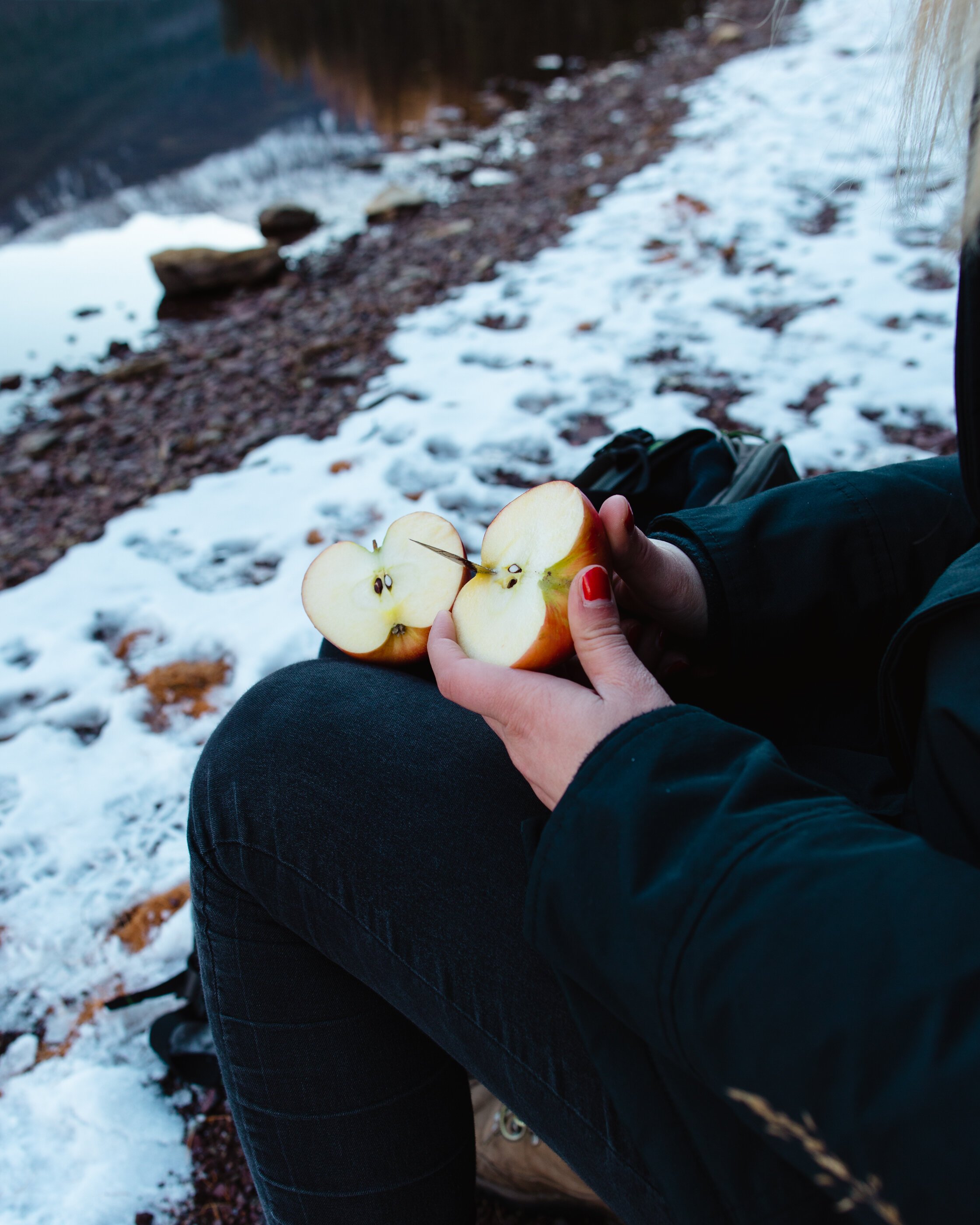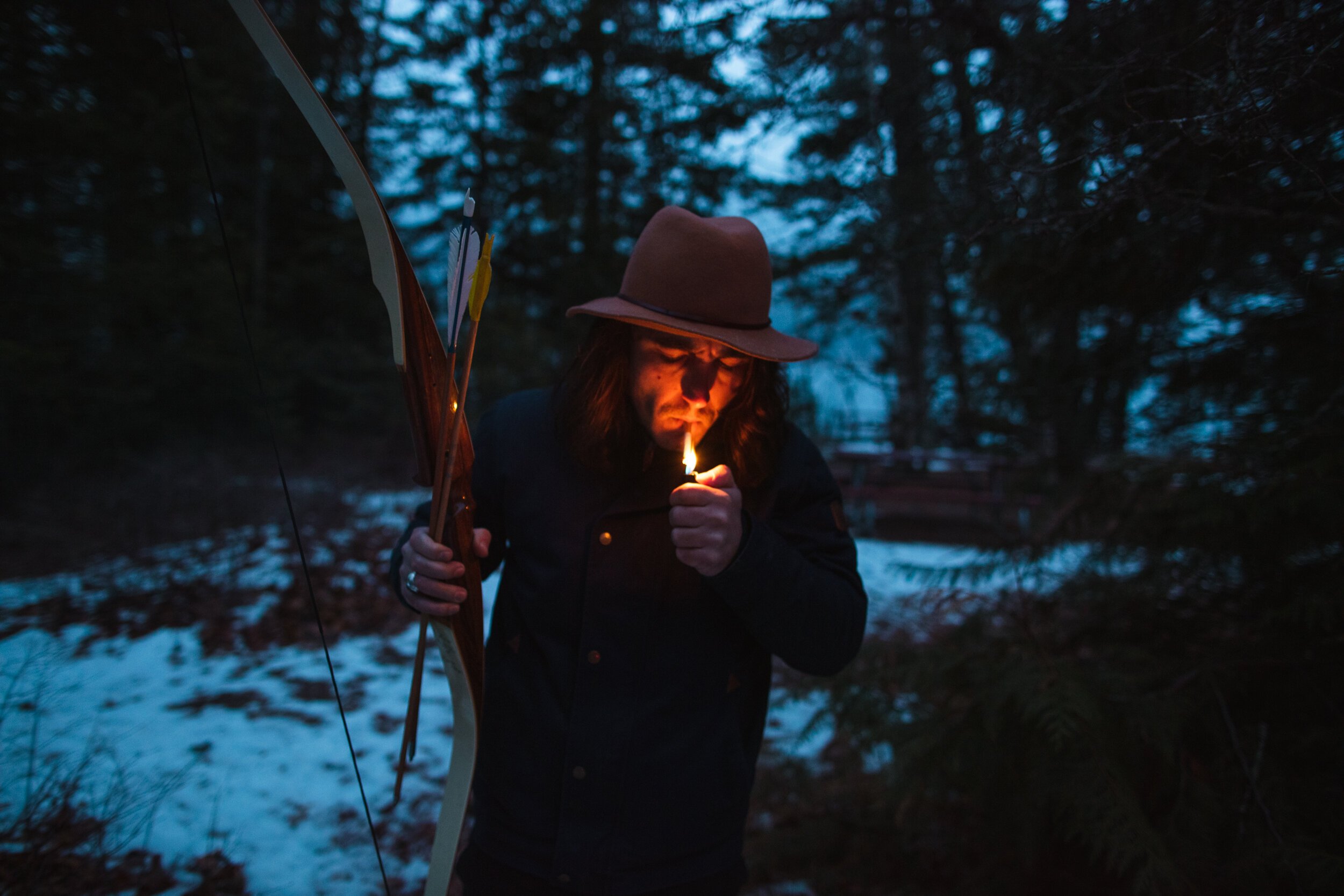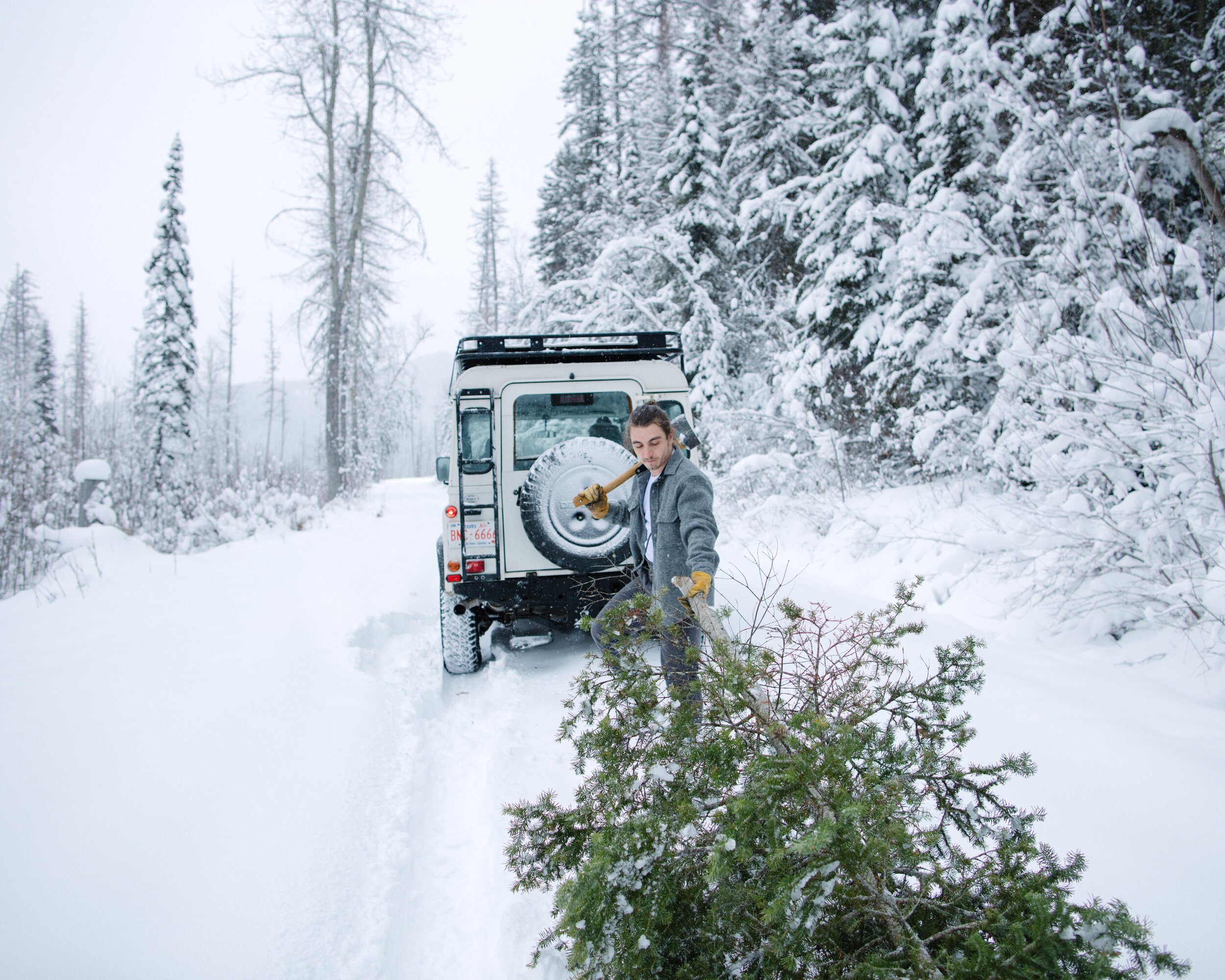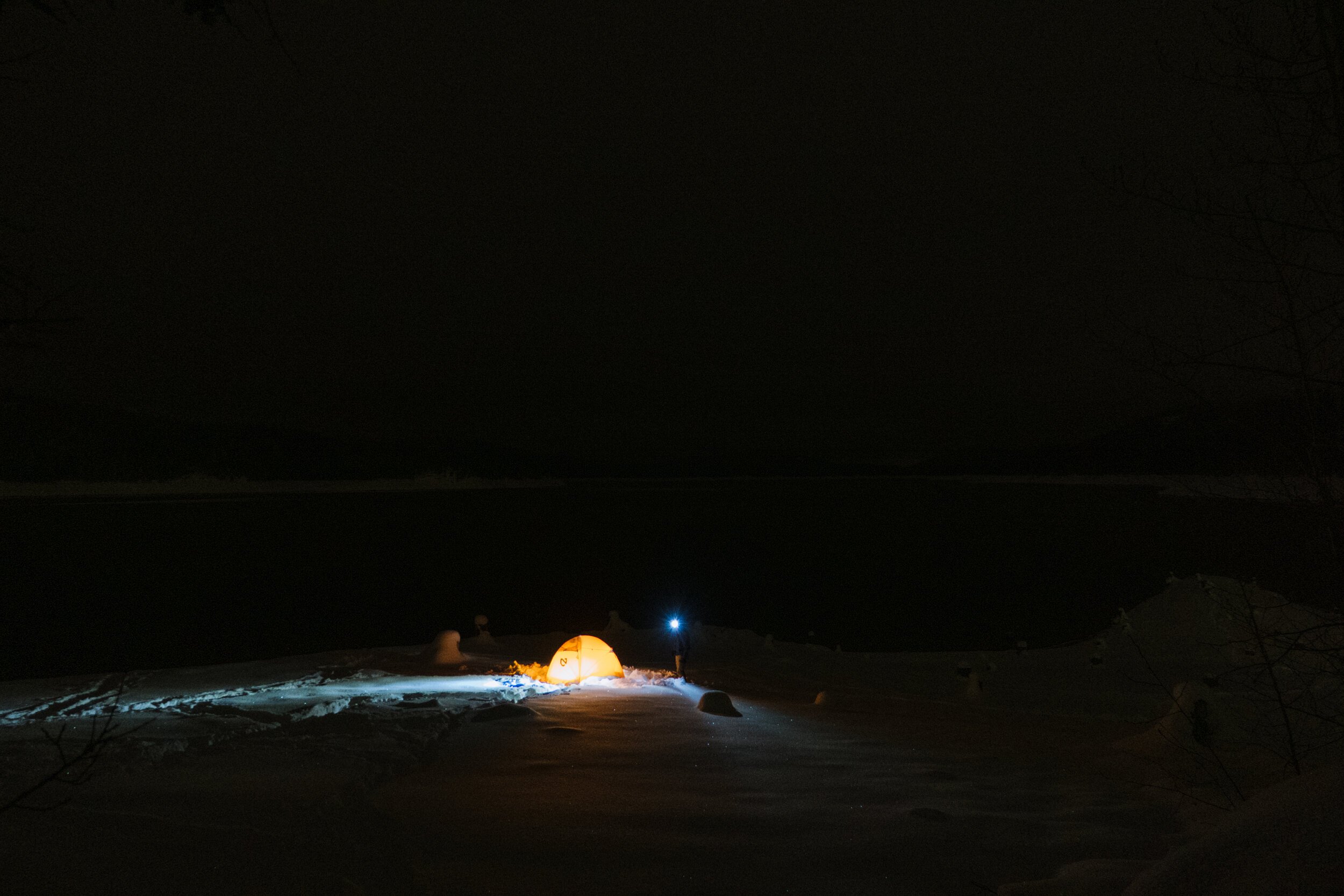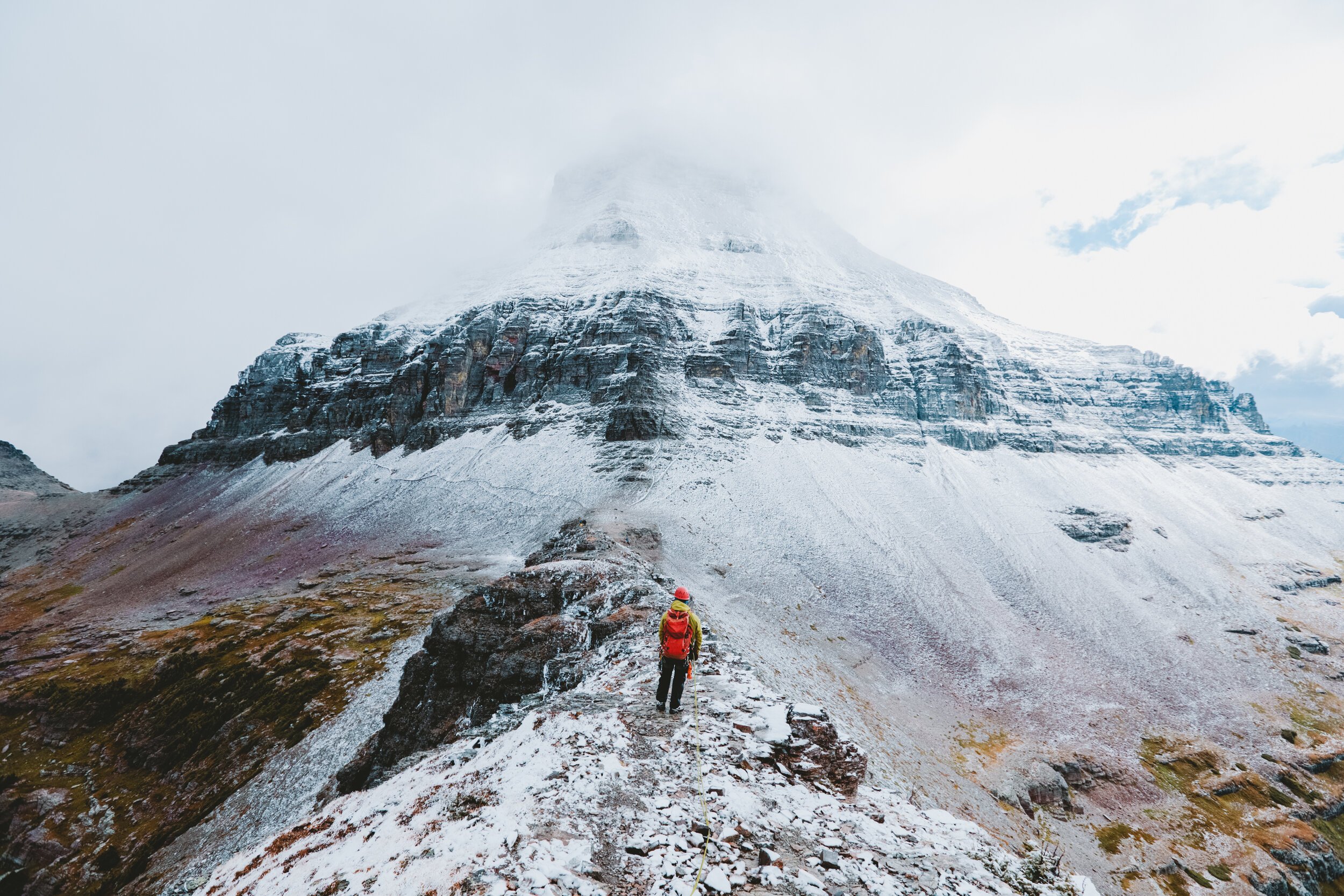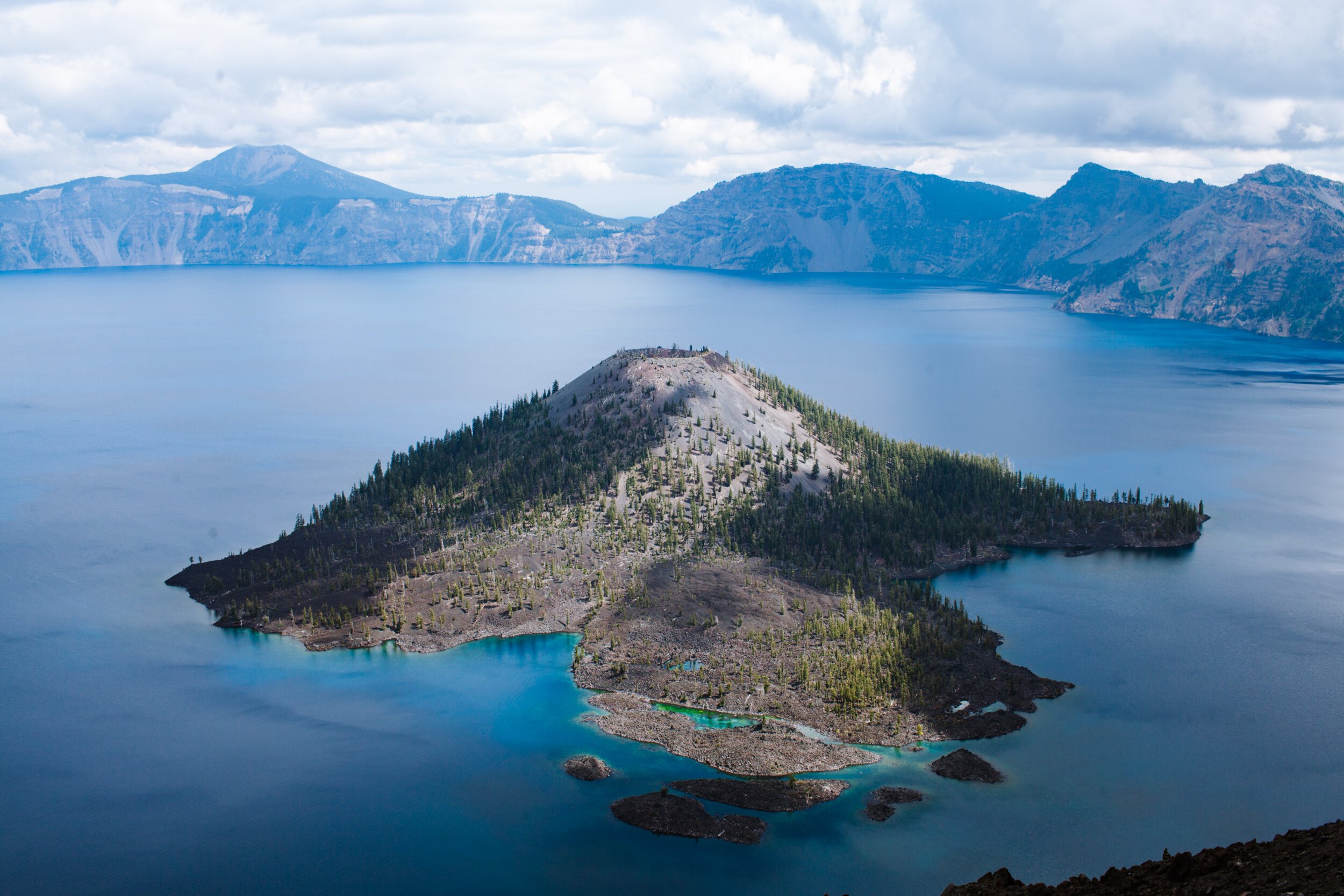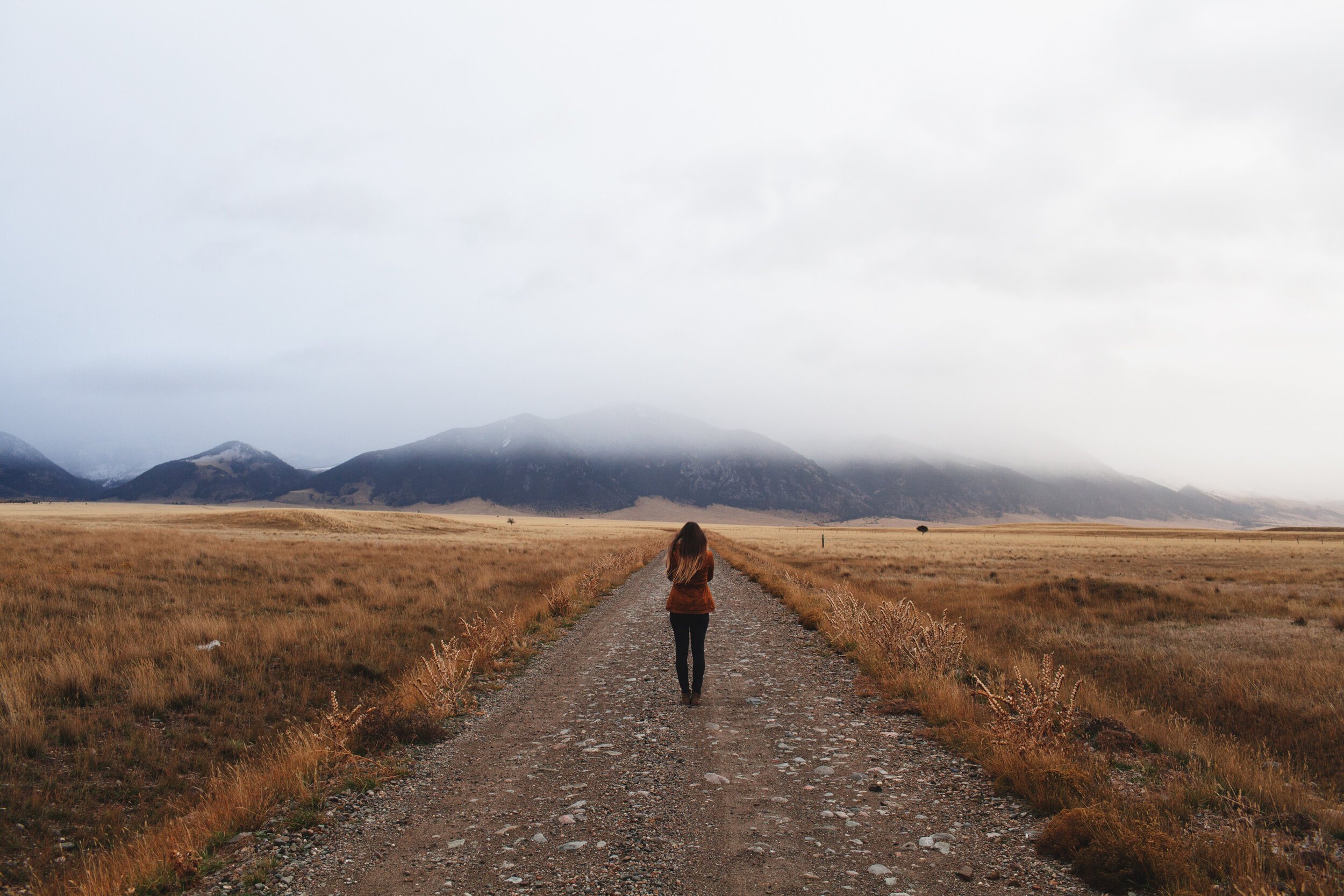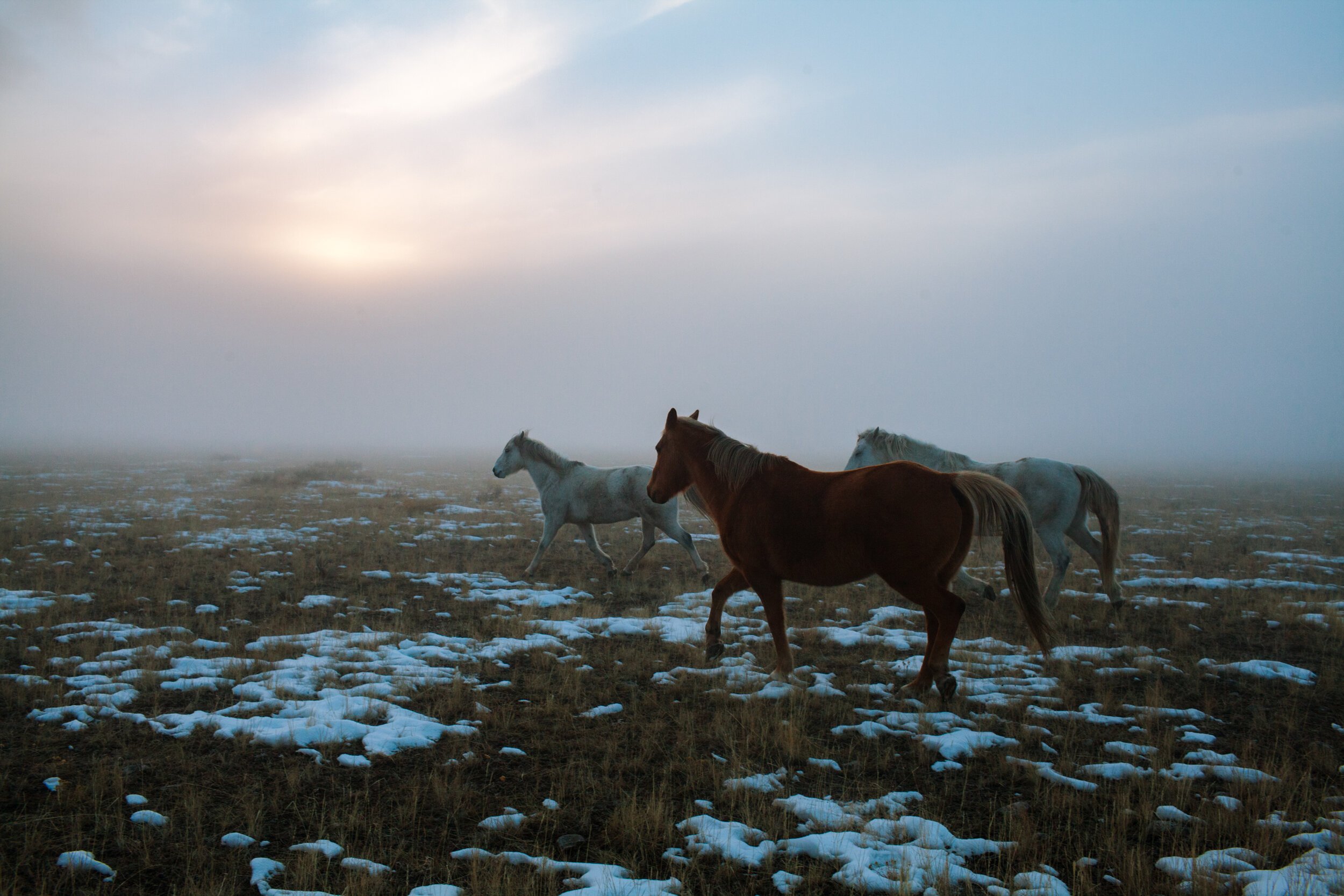Montana (2/2) - The Places That Impacted Me Most
Through half-open blinds I saw the lake standing completely still; the sky was light grey, rain drops pattered across the deck. I sat on a soft leather sofa mindlessly browsing through several dubiously designed local activity brochures. One of my projects in graphic design school involved tearing apart and redesigning a handful of brochures from local businesses; holding those reminded me why I never pursued graphic design: it's an uphill battle. However, the names on the brochures brought me happiness: "Glacier National Park." "Welcome to Montana." It felt like visiting an old friend—at last, we were in Montana.
The previous night we checked into a small but quaint apartment near the shores of Whitefish Lake. We slept like the dead after a nine-hour drive from Seattle. When we woke, we only had one thing on our agenda: a meeting with Isaac Johnston, manager of the vacation rental company that would host Andrea, myself and a cohort of our best friends throughout the winter in the Flathead Valley.
We met Isaac and his co-worker, Benji Poffenroth, at the local coffee shop, Montana Coffee Traders. It's a warm atmosphere—brick façades and hanging lights above the tables. I can't recall the specifics of our conversation, but I remember an issue: we were eyeing large houses to host all of our friends, but Isaac and Benji had trouble convincing the owners to let us stay rent-free. The managers had to explain to the owners that trading rent for marketing imagery and Instagram advertising would increase their rental income for the year. Nowadays that's a popular pitch, but it was a bit harder to grasp in 2015. Ultimately, Isaac let with a plan to convince one of the owners who had a 7,000 sqft. mansion in Bigfork. He and Benji seemed confident, so we took off to run errands, hoping that our faith was in good hands.
Andrea’s and my first excursions in Montana
A few days later, Isaac shared some excellent news: Andrea and I would be spending the winter in a custom lodge built on the side of a mountain with panoramic views of the valley. And this time, we weren't paying rent.
These days, when I tell people the story, they often think I was crazy to ask complete strangers if we could stay in their homes for free. While it sounds unreasonable to some, it made perfect sense for me. The world is visual, social media as we know it was barely starting, and a lot of people were getting in line to have their piece of the cake. Us “youngsters” had something hot going on, and those who knew it could get pretty much anything they wanted... but I digress. Back to Bigfork.
The Bigfork Mansion on the first snowfall of the year
The reading nook on the top floor - outside, the Swan Valley.
Morgan Phillips was the first guest to arrive. After our experience the previous year in the Madison Valley cabin, he spent another winter with us. He couldn't believe we had such a massive house to ourselves, either. He set up quarters in one of the lower level bedrooms near the cinema room. A few days later, the second guests arrived: Rishad and Sheila, his girlfriend at the time. They moved into the upper level bedroom, adjacent to the bar and entertainment room. With the house feeling pleasantly occupied, we were ready for a winter for the books.
Every morning at breakfast, the same topics came up in conversation: When will it snow? Where should we go shoot today?
We all expected the former because we hadn't received much snow the previous winter in Southwest Montana —as soon as it fell, it blew away in constant gales. This time we had high hopes for a white winter. It would be new to all of us: Andrea is from Southern France, Morgan is originally from Alabama (he doesn't have an accent, unfortunately, but he can be seen skinning raccoons while wearing denim overalls from time to time... Okay, I made that up—I could only wish), Rishad is from Vancouver, BC, (more rain than snow) and I was born in Spain.
The latter question, where to shoot, was an easier affair—point the car north, park, start hiking. It was a treat to consistently spend time on unassuming trails with good friends in search of great views. I loved every second of that fall.
As winter settled, it finally started snowing. Quite a lot, actually. We had all hands on deck maintaining our long driveway, drifting the 6x6 John Deere Gator Plow around the house, and building ski jumps. In early December, Isaac, who had become a frequent guest of our photography filled jaunts, invited all of us to go "Christmas tree hunting" near Hungry Horse Reservoir.
I like to think that there are always people who can completely change the way you experience a place. You think you have a good grasp of an area because you like maps or enjoy getting lost on random trails; but no matter how much work you put in, there's a local out there who has been doing it for way longer than you. They know everyone. And they have been just about everywhere. That was Isaac. That afternoon looking for the perfect Christmas tree with he and his family opened my eyes. It felt like a well curated tour, but with more personality and generosity. We had a blast. As soon as the sun set, Isaac's wife whipped out a homemade chili and corn bread from the back of their Land Cruiser, warmed it up with a camping stove, and started handing bowls to all six of us. Meanwhile, Isaac had already started a fire and was chopping logs for everyone to sit on so we could lap up our chili, fireside. That's Montana hospitality.
Personally, I find an adventure truly fulfilling when I experience a healthy dose of fear. Not like stage-fright fear that makes your armpits smell. I'm talking about healthy fear that creates focus and forces you to be precise in your movements. It's often felt in situations where if you f*ck up, you might die.
We had a few of these moments that winter, but the most memorable was the one we infamously dubbed the “Frozen Island Camping Trip.” On that same night we ate chili and corn bread over Hungry Horse Reservoir, we talked about an island seen in the distance. I asked Isaac if he'd ever paddled there and camped. He shook his head, no, and I got really excited—I'm inspired by the geographic isolation of islands. So we decided we'd all go camp on the island that winter.
One cold February morning, we dragged over-packed canoes through knee-deep snow to the shores of Hungry Horse. The access road wasn't plowed so it became a two-mile slog. Because of the unforeseen post-holing, we were running two hours late and the setting sun was already blocked by the mountains, casting a dreamy end of day blue light. I remember thinking, how was it that no one in our well-rounded crew—Isaac, Morgan, Rishad, my college friend visiting from France, Julien (Buchowski), and guest of honor Olivier Dabene (a.k.a. Andrea's father)—objected to camping on an island in the middle of February?
We had no time to waste—it was getting dark and we still had to get to the island. We cracked the ice that had formed on the shore, slid the boats in the water and started paddling due west. The lake was like a mirror and there wasn't a single cloud in the sky. (I'd later learn to expect very cold temperatures on clear nights.) The two and a half mile paddle turned out to be relatively easy—we even had a few giggles at Rishad who, at over six feet tall and heavy handed, dangerously tilted the canoe with the slightest movements. It was like watching a Great Dane trying to ride a penny board.
We dug holes in the snow, anchored our tents and set about gathering wood to make a fire. Soon enough we were all huddled around it, enjoying a hearty dinner of couscous and skillet grilled sausages. Canoe camping was certainly more luxurious than backpacking. Isaac had brought every kitchen accessory known to man in what came to be known the BOMT, "The Box of Many Things." (He regretted his decision as soon as we saw the unplowed access road, but you can rarely plan this stuff.) After dinner we made some photos of the stars and turned in for the night. At least, I did. Through the walls of my tent I could hear the faint voices of Julien and Rishad talking and sipping whisky around the fire long into the night.
Dawn broke after a very cold night. I had woken up to put on my down jacket because the 18 degree bag (-15c) wasn't keeping me warm enough. We later saw that the local weather station recorded -27c that night. The icy silence was broken by Rishad's voice:
"Guys! I think the lake froze!"
"What?! No f*cking way" replied Isaac.
After a hurried serenade of tent zippers, we all stood in our long-johns, boots unlaced, looking at the lake. All of us except Julien, who was still snoring. But Rishad was right, the lake had frozen over. We swiftly walked to the shore to evaluate the ice—if it was thick enough, we could walk back on it; if it was thin enough, our canoes might break through it. We prayed it wasn't somewhere in between.
Isaac slammed an axe to the ice. It broke in small chunks. It was about 1 in (3cm) thick which is exactly the middle ground where canoes struggle to tear through, but not thick enough to walk across. On the bright side, the sun shone and warmed the surface. We decided to pack up camp and wait it out. At the time we didn't fully realize the trickiness of our situation; we just saw it as another challenge to overcome. It was exciting. We tried not to think about if a crew's canoe lost balance and flipped, and how difficult and risky it would be to rescue them. In retrospect, I've learned to wear a drysuit for winter paddling—similar to a wetsuit but with room for layers underneath to keep you warm. At the time, we were ill prepared for the mission ahead and nobody had one.
As noon arrived, we decided it was time to go. The temperatures were well below freezing and the ice wasn't getting any softer. When we tried to put the boats to water our fears were confirmed—they weren't cutting through the ice. Any attempt to force them through made them tilt sideways precariously. So we devised a plan: in a single line formation, we would take turns breaking the ice for each other—a job done by the crew member at the bow who had to violently slam his paddle at the ice while making sure not to roll the canoe. Seemed simple enough. Rishad and Isaac's crew set off first with Morgan, Julien, Olivier and myself in tow. It was sketchy at best—seeing 200 pounds of Rishad hit the ice while Isaac attempted to steady the stern was pretty scary. But slowly we made progress. Morgan and I took the lead while the other crew rested, and inch by inch we trudged through. About halfway through the crossing Julien and Olivier took over, strongly leading us to near the end.
The channel we left behind
As we neared shore, the tension eased—we'd be able to swim back at that point. The sun was still out and we took our time enjoying each other's company and making a few photos. But we knew we still had to tow our over-stuffed canoes back to the cars some two miles uphill. We weren't particularly excited by that prospect, especially because most of our clothes were soaked. At least we'd warm up on the way.
Now, I'm not exactly sure how it all happened, but after seeing Isaac on the phone before starting our ascent, we soon heard an engine in the distance. Suddenly, around the bend we saw a massive construction machine, shovel down, tearing through the snow in our direction. It was Isaac's uncle Ovila, plowing the road with his chained-up road grader, coming to tow our canoes back for us. A genuine Montanan. I was again reminded of the immense value of someone like Isaac, a local friend, who always has a relative nearby willing to lend a hand... or an industrial grader. In no time we were back at the cars, loading up the gear, happy that we pushed through as a team.
Julien and Isaac riding in the towed canoes
I split the remainder of winter between long mornings of work (editing photos, conference calls with clients, building presentations) and afternoons of play. Among the most memorable outings was skiing to the top of Apgar Mountain for sunset over Lake McDonald and Glacier National Park. It was one of my first excursions with local legend David "Powder" Steele. I stumbled upon his adventure blog—skinningwithbearspray.com—and after exchanging a few emails we hit it off and went on a handful of trips together. Dave is the kind of guy who always has a burrito in his pack and is down for a suffer-fest—I enjoy spending time in the hills with him.
We spent many days soaking in Isaac's homemade "hot tub on a rock," interspersed with icy dives into the frozen Swan River in his backyard. We took photos of those regular sessions and that little tub became something of a local gem. One day at a local coffee shop, I overheard a group of teenagers talking about it—their leader even claimed to know where it was and suggested they should swim there that very night. Funnily enough, Isaac had taken the hot tub somewhere else weeks ago!
The hot tub on a rock
We were all dreading the first day of March when our stay at the Bigfork lodge ended. Rishad went back to Vancouver and Morgan, Andrea and I stayed in the valley. Bouncing from rental house to house every few weeks, Isaac was able to put us up until summer—the busiest time for vacation rentals. When high season arrived, we'd be on our own.
Thanks to the temporary nature of our arrangement, we experienced every corner of the valley. However It took a mental toll on Andrea who was already anxious with the idea of moving. I felt bad for her, but we enjoyed the area thoroughly, so we started looking for land of our own. We had our eyes set on Whitefish for a variety of reasons: quick access to the ski resort (10 minutes from town), the best selection of restaurants and shops in the valley, and our favorite small-town atmosphere. In June, just before we planned to head back to France for the summer, our realtor told us she had a "very interesting lot'' for us to see. It was a stone's throw away from the slopes of Whitefish Mountain Resort (known to the locals as Big Mountain), and very well priced as that part of Montana hadn't fully recovered from the 2009 sub-prime mortgage crisis. We surveyed it the following day and put down an offer the next. It was love at first sight.
Montana (1/2) - The Places That Impacted Me Most
I looked at the yellow rolling hills with pure excitement, a warm feeling was going through my body, it felt like I was meant to be there.
Seeing Montana for the first time in my life.
It was the spring of 2009 and I was on a cross-country road trip with a college buddy named Marco. We left home in Quebec City, Canada, and pointed our old Subaru Wagon toward Los Angeles, planning to take our time in the Rocky Mountains. After driving all day through the Dakota flats, we finally entered the highly anticipated state of Montana. We only had two days to get a feel for it before we have to cross back into Canada on our way west.
Growing up I heard countless stories from my dad who—for what now feels like fortuitous reasoning—studied forestry in Missoula in the 1960s. Those two years my French-born father spent in the American West had been so impactful for him that he showered my brother and I with epic tales ranging from backcountry skiing bear encounters, to the life of a ranch hand, to getting lost in blizzards, and simply baking a lot of soufflés for bewildered Montanans. There was no shortage of inspiring material for a twelve year old.
Frederic Strohl’s Montana adventures:
And so it was that 42 years later, Marco and I spent two days romping about the northwest part of the state (the most beautiful part, in my view) and crossed into British Columbia on our frenetic coast-to coast jaunt. Truthfully, I don't remember much about that time in Montana except for the sign of the Big Sky Motel somewhere back on Interstate 90, and Flathead Lake. Driving the western shore on a sunny afternoon was pretty impressive for a guy who was used to quaint European landscapes. The lake is enormous—so big, in fact, that "you can see it from space," as the locals say.
In fact, I don't remember much about that entire trip, except that neither of us used a cellphone nor a GPS on the entire trip. And yet, it’s on that trip that I decided to dedicate my life to making photographs of the natural world.
It's important to note that my dream at this point was to move to Los Angeles to become a commercial photographer. I thought I needed to be close to the "industry" to "make it." (Blame these preconceived notions on shows like Entourage.) Therefore, in 2014, my girlfriend (now wife) Andrea Dabene and I packed our tiny studio in Vancouver, BC, loaded our lives in the back of a rented Ford Flex and drove to California, dreams in tow.
The drive from Vancouver to California, 2014.
We posted up at my Aunt Junie's place outside of L.A with three thousand dollars to our name. As the months went by Andrea and I met a lot of great people, and even experienced a fair share of commercial success as photographers; but something was off. I was tense and irritable and Andrea was sick of it. We fought a lot. One night after an argument about traffic (or something stupid), I sat down for some introspective thinking: I was a guy who thought he was living his dream, but all I'd found was that this childhood fantasy wasn't what I wanted at all.
Two days later, I pitched Andrea this idea to move out—just for the winter—to a remote cabin in Montana I'd found on Craigslist. I didn't expect it to go over that well since I'd put her through a lot of changes over the past several years and promised Los Angeles would be the last one. To my surprise, she was into it (always such a trooper), keen to live in a log cabin 25 miles from the nearest "town" in Southwest Montana... in the winter. So once again we packed a carful of bags and boxes and headed off into the unknown.
Postcard from Zion National Park on our drive to Montana, 2014.
Postcard from The Tetons, 2014.
It was October when we arrived, and in hindsight I couldn't have chosen a better time to show Montana to Andrea. As we crossed the Wyoming / Montana border, we were greeted by an endless sunset over the Madison Range, the aspens wearing their brightest yellows and the peaks capped with a dusting of snow. On a piece of paper, we have a rough description of the cabin and an address that no GPS seemed able to locate: 91 North Palisades Drive.
Just as we were making another u-turn on another forgotten dirt road Andrea yelled
"I see it! There, the house with the blue roof," "And there's a river in front of it!" I exclaimed.
We pulled into the long driveway and made our way to the wood cladded front door. Hesitantly we knocked—nothing. So, with a shrug, we inserted the key mailed to us and stood in the doorway of our new home for the next several months. It was a nice place: out the living room, the Madison River; to the North, one house about a mile away; to the South, nothing.
"Is there Wi-Fi?" Andrea asked, breaking the silence.
I told her I had no idea. "The guy I spoke to seemed unsure."
"I don't see a network..."
"Well, shit."
And that's how one of our favorite winters began. Pure wilderness around us, no Internet and a cast-iron stove to keep us warm through the long Montanan winter.
The cabin, 2014.
About two weeks later our friend Morgan Phillips joined us. There were three bedrooms in the cabin so we offered a room to a handful of friends we thought might appreciate the isolated setting and be tolerable to live with. Morgan fit the bill. He was a treat to share a house with, and we've stayed close friends ever since.
On the last week of October, Andrea and I made plans to head North for the weekend to see Glacier National Park before it closed for the winter. We pulled into Whitefish on the night of Halloween for a late dinner. There was a bustling energy in the air, a drastic change from our previous month of cabin-bound isolation down south. We didn't expect the small town to be quite so alive. Andrea loves a festive atmosphere. I had no plans at that point to make the town our home, but I was happy with her first impression of Whitefish.
We stayed a week at Gerald Askevold's place, one of Dad's university friends from the sixties. He lived on the far end of Blanchard Lake. Every morning I'd finish breakfast, throw a jacket on, walk to the dock camera-in-hand, hop in the old aluminum canoe and set off into the fog. I'd float in total silence except for the ripple of the canoe. Slowly the fog would dissipate under the heat of the sun, and inch by inch the landscape would reveal itself.
Our time was well spent between lazy picnics along alpine lake shores in Glacier National Park, a few hikes on the trails that were still open, and a ton of photo stops in between. It felt like my first time seeing this place. Bowman Lake was the place we enjoyed the most—the larch trees were at peak color and it was a foggy day. We spent the afternoon reading there, alone but for each other's company.
A week around Glacier National Park, 2014
On the return drive south to the cabin we had a long conversation about what we had seen and experienced in Flathead County. We both wanted to return. Our present living situation had some issues: while Andrea loved the winter cabin, she wasn't fond of the isolation, nor the prevailing winds of the Madison Valley. On top of that, our rental agreement only lasted through March. The only thing we knew for sure was that we would not be going back to Los Angeles.
We had plans to go back to France for the summer to shoot my first book, Alternative Living, so we only needed to find a place to stay for the spring. For reasons I can't quite remember we spent that season near Seattle, in a little cabin called Tye Haus. In mid-June, we boarded our flights to Paris and went on to travel across eight European countries, from France all the way to the northernmost part of Norway.
In early October, after four months on the road, Andrea and I were resting in a small fishing hut turned B&B in Norway's Lofoten Islands. We were having an all-too-familiar discussion of where we'd go next. Our weeklong trip in Northwest Montana had left quite an impression on us, and it kept coming up in the conversation. For me, it made perfect sense: Dad had made his way in those parts, I'm attracted to large mountains and glacial lakes, and Andrea loved the quaint town feeling. We looked up some rentals online and found a company called Montana's Best Vacation Rentals, and they happened to have an Instagram account. (Back in those days it wasn't common for small businesses to use the app.) I got in touch with them, explained that we wanted to spend the next winter in the Flathead Valley and we would trade our stay for photos. It was a simple enough pitch, but I seriously doubted a small business in Montana would go for it. Thankfully, I was wrong. (First lesson in dealing with Montanans: They're a proud bunch; never underestimate their ambition. Turned out the company's GM, Isaac Johnston, was into our idea and even knew our work from Tumblr! It's a small world...)
Six days of driving, a long flight across the Atlantic and a longer one across the States, and we arrived back in Seattle. On a dreary November morning we packed our vehicle full of our belongings and headed East toward the Rockies. Would that be the last time we do this?
Part II of this piece comes out Sunday April 26, make sure to subscribe below so you don’t miss it.
The Madison Range from the air, 2015.
Westfjords, Iceland - The Places That Impacted Me Most
I'm in what is arguably one of the most beautiful places on earth. The creme de la creme for anyone who is drawn towards places where the ocean meets jagged mountains and cliffs. Where waves abruptly end their journey on thousand foot high volcanic cliffs that formed millions of years ago.
It's 1 in the afternoon, I've gone to bed a 2:30am and had a rought night of sleep in my tent in some windswept field. But spirits are high because my friend and local extraordinaire Haukur Sigurdson is joining me for a gargantuan American style breakfast in his town, Ísafjörður. Haukur is the sort of guy who always has a story to tell, knows every single person in the North of Iceland and can source anything from a red bicycle to a full size sailing boat that sleeps 12 in a matter of minutes.
Haukur, after he found said boat.
I'm meeting with Haukur to tell him about yesterday's jaunt to his cousin's lighthouse. Yep, there's people in this world who own massive yachts, mansions in Malibu and there's Olí who owns 1000 acres of land spread across two valleys with its own lake, river system and 4km of beachfront at the edge of the world. And a functioning lighthouse.
When I heard about it knew I had to go, it sounded like the stuff of dreams for someone who loves getting lost and seemingly pointless endeavours. I arrived there after a quiet 2.5 hour walk up a pass, through a desolate plateau and down the pass towards the ocean. Needless to say I didn't see a living soul around. Just as the sun was setting, there it was, the orange lighthouse with its detached care taker house.
At this point I don't know much about the building, apart the fact that it is the more remote lighthouse in all of Europe, I’m getting the sense that I'm somewhere special. I spot the year '1959' engraved above the door and start to imagine how many local fishermen this building has saved from crashing into the shallows around here.
Haukur said that the door should be open so I knock, wait, and open the door. It's neat inside, there's a piano, a saxophone, an old VHF radio and piles of dusty books sitting on wooden shelves. What else can one need here? The only sign of recent activity I find is the guestbook; the last visitors left this morning. It is dark upstairs the windows are covered by heavy sheets to protect the overnighters from the 24 hour-long summer days found in these latitudes.
After the tour, I sit outside on the big cement slab under the lighthouse and eat a sandwich facing the North Atlantic ocean. The next landmass is Greenland some 250 miles away. It's 11pm, and it feels as I'm in a different planet.
The Westfjords are one of these places that I think about once a week at minimum. They keep me coming back for more but I can't explain why. It's an idea, it's a feeling, it's where you go rub shoulders with the end of the world. To be one with the clouds, to get slapped by a North Atlantic storm, to see what earth might have looked like before we even existed.
I love this corner of Iceland because it is out of the way, a 'detour' for the bucket list travellers who speed through the ring road in 5 days, thinking they saw Iceland but haven't even scratched the surface. To these travelers I'd recommend coming back and spending at least a few days in the Westfjords. There won't be oversized parking lots full of buses but there will be wild beauty, for miles, and a lot of friendly locals.
The view from the tallest mountain of the Westfjords: Kaldbakur
Hornstrandir peninsula seen from Latrar Air Station
Alaska - The Places That Impacted Me Most
My first article on my first blog, this is exciting, it only took a pandemic for this blog to finally move to the top of the agenda. There are still shelves to assemble in my garage and I wonder what else is it going to take it for me to get them upright. A meteorite? Ok now to the subject at hand, the big question: Which places have have had the most around impact on me? It’s fair to say that my job as a commercial adventure photographer takes me to pretty cool places so I should know what I’m talking about right? Let’s just assume that you trust my judgement.
This is the first entry to the “Places That Impacted Me Most” series. Let’s take the time machine to… Alaska, circa 2014.
November 23, 2014, my first time in Alaska.
I landed in Anchorage on a dreary November night, picked up my bags, zipped to the Hertz counter, and was handed the keys to a massive Dodge Ram. Hello Alaska. The reason I was here? To shoot a campaign for Canon's new entry level DSLR dubbed the 'Rebel T6i', rowdy.
The next morning was no different than the night before, low grey clouds, and barely any light by 9am. So much so for our concept of shooting 'Epic Alaskan mountain landscapes' which is what I had sold Canon on.
Nevertheless, I headed down the lobby to meet my two fixers, Jovell and Young Kim. After some small talk and going over the rough planning of the day we hit the road, our destination: Eklutna Lake, a large reservoir up in the Chugach Mountains. The idea was to get there for first light, which in late fall in Anchorage is about 9:45am. Although Young Kim was already asleep snoring in the back of the car, the cloud ceiling was getting lower and lower revealing only about 1/3 of the mountains around us, I was slowly getting my mind blown by Alaska.
Still, seeing how socked in the valley was I was getting increasingly worried about our morning shoot. We left the freeway and started climbing on a narrow-ish road towards the village of Eklutna and by some kind of miracle, after passing the village, we popped out of the clouds and there was pure, clear, light blue sky. Not a cloud in sight above us. We pressed on to the lake which was only a few miles away, parked and started walking towards the shore.
The morning fog was still dissipating over the lake and ever so slowly Bold Peak started rising at the far end of the lake. Within minutes, the west side of the range above us started turning pink, then orange and bright yellow. Sunrise was happening, and I was on a cloud. During this 5 day long Alaskan jaunt, I saw peaks I could only dream of, photographed moose, elk, and saw the northern lights for the first time.
Alaska had a profound impact on me because for a euro kid who is used to domesticated mountains, this was totally different. Miles and miles of Wilderness without anyone in sight, it felt like the edge of the world, where the ocean meets the glaciers. One just has to pull up a map to understand the endless possibilities for adventure here.
— Alex
Moments before peaking through the clouds on our way to Eklutna Lake
10 seconds after we’re through, and our asses are saved.
Jovell and Young Kim, waiting for the fog to clear on Eklutna Lake
Jovell and Young Kim above the clouds once again at the Hatchers Pass abandoned mine.
Jovell and Young Kim convinced a dude to give us a night ride up the Girdwood cable car to shoot the stars
Musk Ox at the Nature Reserve near Portage Glacier



